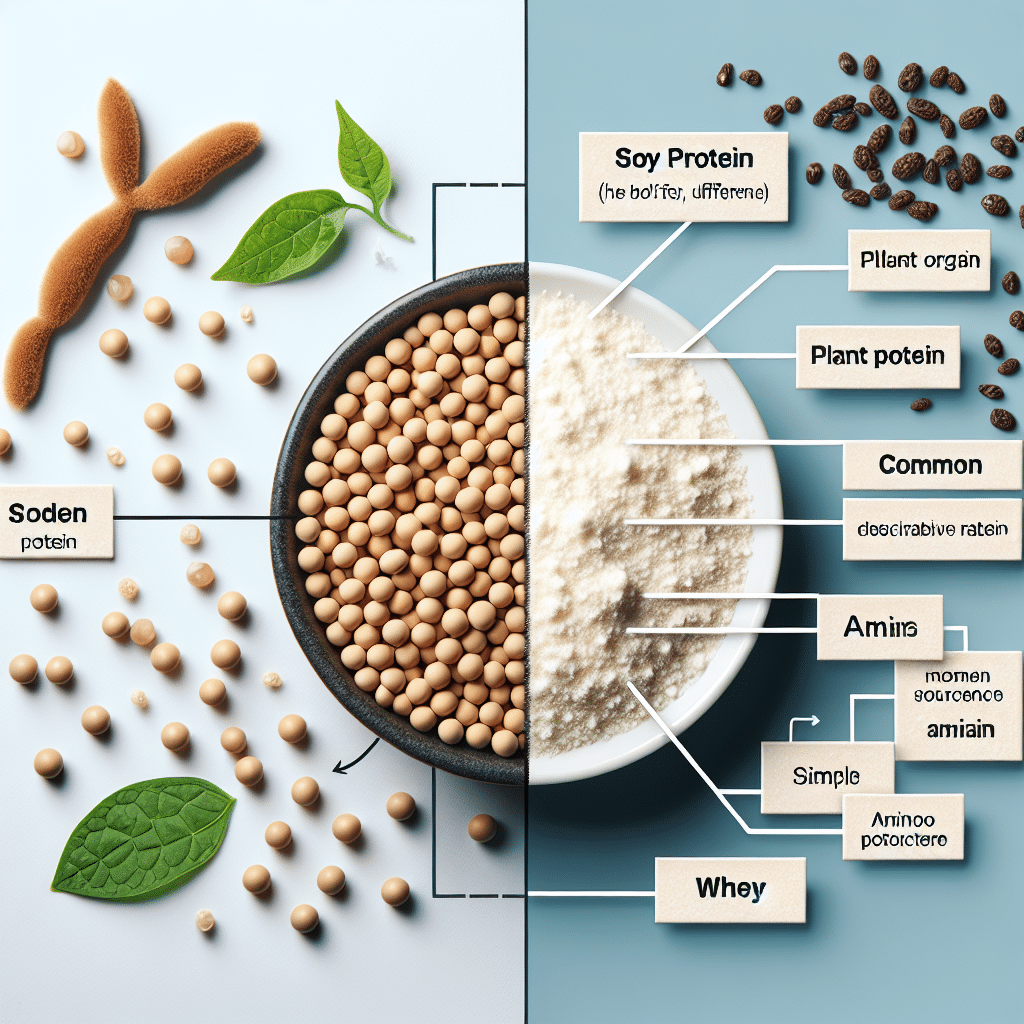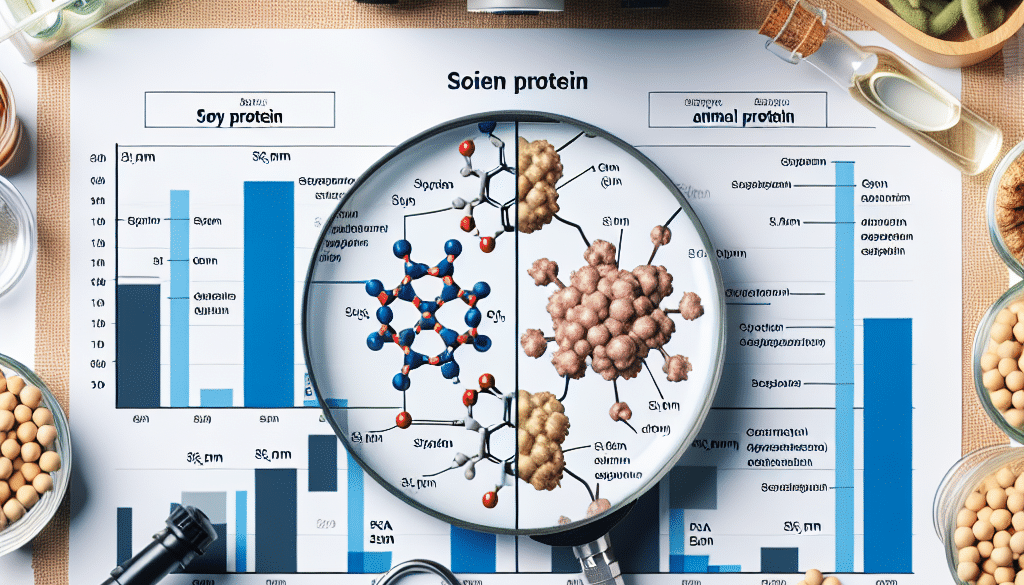What Is The Difference Between Soy Protein And Normal Protein?
-
Table of Contents
- Soy Protein vs. Normal Protein: Understanding the Differences
- Understanding Protein Quality
- What Is Soy Protein?
- Comparing Soy Protein to Animal Protein
- Amino Acid Profile
- Digestibility
- Nutritional Content
- Health Implications
- Environmental Impact
- Case Studies and Statistics
- Choosing the Right Protein for You
- Conclusion: Key Takeaways
- Discover ETprotein’s High-Quality Protein Products
Soy Protein vs. Normal Protein: Understanding the Differences

Protein is a crucial macronutrient that plays a vital role in building and repairing tissues, making enzymes and hormones, and providing a source of energy. While protein is found in a variety of foods, not all proteins are created equal. In this article, we will explore the differences between soy protein, a plant-based protein source, and what is often referred to as “normal protein,” which typically means animal-based protein.
Understanding Protein Quality
Before diving into the specifics of soy protein and animal protein, it’s important to understand the concept of protein quality. Protein quality is determined by two main factors:
- Amino Acid Profile: Proteins are made up of amino acids, which are the building blocks of protein. A complete protein contains all nine essential amino acids that the body cannot produce on its own.
- Digestibility: This refers to how well the body can absorb and utilize the amino acids from a given protein source.
Animal proteins such as meat, dairy, and eggs are considered high-quality proteins because they contain all essential amino acids and are highly digestible. Plant proteins, on the other hand, often lack one or more essential amino acids and may be less digestible.
What Is Soy Protein?
Soy protein is derived from soybeans, a legume that is a staple in many Asian diets and has become popular worldwide as a versatile and plant-based protein source. Soy protein comes in various forms, including soy protein isolate, soy protein concentrate, and textured soy protein.
Comparing Soy Protein to Animal Protein
Amino Acid Profile
Soy protein is one of the few plant proteins that is considered a complete protein, meaning it contains all nine essential amino acids necessary for human health. This makes soy protein a viable alternative to animal protein for those following a vegetarian or vegan diet.
Digestibility
While soy protein is a complete protein, its digestibility is slightly lower than that of animal protein. However, the difference is minimal, and soy protein is still considered a high-quality protein source.
Nutritional Content
Animal proteins are rich in nutrients like vitamin B12, iron, and zinc, which are less abundant in plant-based diets. Soy protein, however, is naturally cholesterol-free and low in saturated fat, making it a heart-healthy option.
Health Implications
Consuming soy protein has been associated with various health benefits, including improved heart health, reduced risk of certain cancers, and potential benefits for bone health. Animal proteins, while nutritious, can also be high in cholesterol and saturated fats, which may contribute to heart disease when consumed in excess.
Environmental Impact
The production of soy protein generally has a lower environmental footprint compared to animal protein. It requires less land, water, and energy and produces fewer greenhouse gas emissions.
Case Studies and Statistics
Several studies have highlighted the benefits and considerations of soy protein compared to animal protein. For example, a study published in the American Journal of Clinical Nutrition found that soy protein can lower cholesterol levels, which may reduce the risk of heart disease. Additionally, the Food and Agriculture Organization (FAO) has reported that soy production is more sustainable than livestock farming, with lower greenhouse gas emissions and less water usage.
Choosing the Right Protein for You
When deciding between soy protein and animal protein, consider the following factors:
- Dietary Preferences: Vegetarians and vegans may prefer soy protein as a plant-based alternative.
- Health Goals: If you’re looking to lower cholesterol or saturated fat intake, soy protein might be the better choice.
- Nutritional Needs: Those with specific nutrient requirements should consider the unique profiles of each protein source.
- Environmental Concerns: Environmentally conscious consumers may opt for soy protein due to its lower ecological impact.
Conclusion: Key Takeaways
In summary, soy protein is a complete, plant-based protein that offers a comparable amino acid profile to animal protein but with different health and environmental implications. While animal proteins are rich in certain nutrients and highly digestible, soy protein provides a heart-healthy alternative with a lower environmental footprint. Ultimately, the choice between soy protein and animal protein depends on individual dietary needs, health goals, and environmental values.
Discover ETprotein’s High-Quality Protein Products
If you’re looking for a reliable source of high-quality soy protein and other plant-based proteins, ETprotein offers a range of products to meet your needs. Their organic bulk vegan proteins are non-GMO, allergen-free, and characterized by a neutral taste, making them an excellent choice for various applications.
About ETprotein:
ETprotein, a reputable protein and L-(+)-Ergothioneine (EGT) Chinese factory manufacturer and supplier, is renowned for producing, stocking, exporting, and delivering the highest quality organic bulk vegan proteins and L-(+)-Ergothioneine. They include Organic rice protein, clear rice protein, pea protein, clear pea protein, watermelon seed protein, pumpkin seed protein, sunflower seed protein, mung bean protein, peanut protein, and L-(+)-Ergothioneine EGT Pharmaceutical grade, L-(+)-Ergothioneine EGT food grade, L-(+)-Ergothioneine EGT cosmetic grade, L-(+)-Ergothioneine EGT reference grade and L-(+)-Ergothioneine EGT standard. Their offerings, characterized by a neutral taste, non-GMO, allergen-free attributes, with L-(+)-Ergothioneine purity over 98%, 99%, cater to a diverse range of industries. They serve nutraceutical, pharmaceutical, cosmeceutical, veterinary, as well as food and beverage finished product distributors, traders, and manufacturers across Europe, USA, Canada, Australia, Thailand, Japan, Korea, Brazil, and Chile, among others.
ETprotein specialization includes exporting and delivering tailor-made protein powder and finished nutritional supplements. Their extensive product range covers sectors like Food and Beverage, Sports Nutrition, Weight Management, Dietary Supplements, Health and Wellness Products, and Infant Formula, ensuring comprehensive solutions to meet all your protein needs.
As a trusted company by leading global food and beverage brands and Fortune 500 companies, ETprotein reinforces China’s reputation in the global arena. For more information or to sample their products, please contact them and email sales(at)ETprotein.com today.












